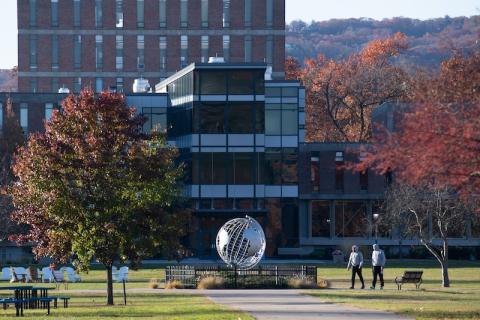
University Introduces Criminology, Law Enforcement, and Rehabilitation Concentrations in Criminal Justice Program

Westfield State University has introduced three new concentrations in its Criminal Justice program: Criminology, Law Enforcement and Homeland Security, and Rehabilitation and Restoration.
This year, Westfield State University has launched three new concentrations within its historic and renowned criminal justice program: Criminology, Law Enforcement and Homeland Security, and Rehabilitation and Restoration. Development of these concentrations began before the COVID-19 pandemic, though progress was paused until the return to normal campus operations. Now, these specialized tracks offer students focused options that align with their career goals while preserving the program’s strong liberal arts foundation.
The new concentrations are designed to offer guidance for students, particular those in their third and fourth years, as they start to narrow down their career paths, however it also allows students to work in fields that support the mission of criminal justice without being a first responder. Criminology focuses on understanding crime causation and contemporary crime policy, especially for students interested in crime analysis and policy development whereas the Law Enforcement and Homeland Security concentration delves into public safety, law enforcement, and the balance between security and civil rights, ideal for those considering careers in these fields. The Rehabilitation and Restoration concentration provides insight into correctional approaches for reintegrating offenders, with special relevance to students double majoring in criminal justice and psychology.
Dr. Kim Tobin, Professor of Criminal Justice, emphasized that the concentrations are optional, allowing students flexibility while offering others a more guided and streamlined academic experience. “We don’t ever want to pigeonhole people in terms of the degree, because there’s so much you can do,” she said. “Our program’s been around for a long time. It’s one of the oldest in New England, so we’ve always resisted going with the trends in favor of a solid foundation.”
These concentrations also open up new internship opportunities, aligning students with real-world experiences in fields they’re passionate about. Because the criminal justice department collaborates closely with other departments on campus, including psychology, sociology, political science, and ethnic and gender studies, students are ensured a well-rounded education that prepares students to make a meaningful impact both within and outside the criminal justice system
“We also want to allow students to figure it out for themselves,” Dr. Tobin added. “We have really successful students and that broad foundation built by liberal arts and basic criminal justice classes is important. I think for some students, it will work, and others may just want to take some cool classes, which I encourage them to take. You never know when you’re going to use knowledge, and we need to let students take classes that they find joy in. We want to keep students engaged, and sometimes that’s the best way to begin, is to offer these new areas of focus to them but also let them pursue what interests them without those guidelines.”
As the nature of the criminal justice field is immensely diverse, Dr. Tobin emphasized the importance of the human element within the various fields of study, commenting, “On this journey, students develop an understanding of humans and of the different ways we come into the world. That’s why we’re not a training program. The liberal arts foundational education is just as critical to a criminal justice major’s success than just the classes they’re taking with us. We can’t be all things to all people, so we need to rely on others at the University as well, and I want to emphasize that.”
Overall, these concentrations are flexible by nature and are completely optional to those who may find them helpful. While they can help to serve as guidelines for students, Dr. Tobin also highlighted the freedom of the criminal justice major and encouraged students to seek out opportunities which best align with their aspirations.
“The concentrations are designed to give them direction and focus,” Dr. Tobin said. “I also think it helps some students understand what aspect of the system they’re actually interested in. Some come in and they’ll want to take specific classes, but don’t understand why they like those classes when it’s because they like the whole area of study. The new concentrations are great, but they’re also not everything we do. Our goal has always been to provide a strong, broad education for students. We don’t want them to feel limiting. Some students come to the University already knowing what they want to do, and some change their mind or just say, ‘I really like criminal justice, and I want a four-year degree in it.’ So, we have the new concentrations to help.”


